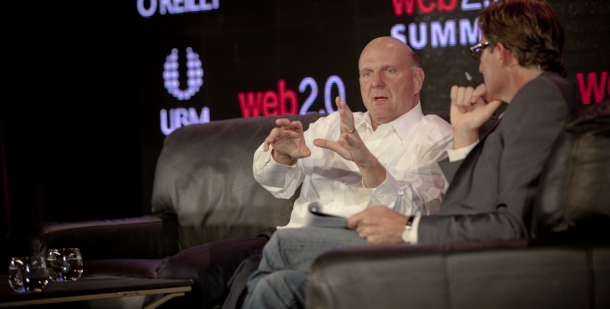CEO Ballmer's (non)answer on whether Microsoft will build its own Windows Phone

Microsoft has put all its eggs in the multiple-OEM basket with Windows Phone.
Or has it?
Microsoft CEO Steve Ballmer was the last speaker on the hot seat at the Web 2.0 Summit on October 18. Federated Media host John Battelle asked Ballmer about a wide-ranging set of topics in his 20-minute interview -- everything from whether Ballmer regretted not buying Yahoo for $44 billion in 2009 (to which Ballmer replied "Sometimes you're lucky"), to Skype's role as a social-media property.
The one question to which Ballmer's (non)answer somewhat surprised me was Battelle's query about whether Microsoft would ever make its own phone. Even though the short-lived Kin was actually a Microsoft phone, despite Microsoft execs' claims to the contrary, Microsoft has not gone the Apple route and created a closed-platform, end-to-end phone ecosystem with Microsoft itself as the only "OEM."
In response, Ballmer told Battelle that the company was "focused on enabling hardware innovation." Battelle re-asked the question, noting that making one's own phone didn't preclude hardware innovation. But Ballmer didn't explicitly defend the current Microsoft multiple-OEM model. Instead, he repeated that Microsoft would focus on enabling hardware innovation..
The interpretations of that statement varied, as I saw on Twitter. Some took it to mean enabling hardware innovation of partners. And it's worth noting that Ballmer also proudly told Battelle and audience that Microsoft phone partner Nokia would be showing a "bunch of new devices running Windows Phone" at the Nokia World show in London next week.
But Ballmer never said, point-blank, that Microsoft wouldn't make its own Windows Phone.
In some ways, if Microsoft were to follow more of an Xbox-like model with phones, it would make life easier for itself. The company seemingly has licked operating system distribution problems, as its nearly problem-free delivery of the Mango Windows Phone update over the past couple of week has proven. However, there are reports from Mango users of a variety of problems seemingly introduced with the Mango update -- everything from disappearing soft keyboards, to Zune service freeze-ups, to battery-drainage issues. Some of these problems, like the Zune one, seem to be tied to a single hardware platform (in the Zune case, HTC's). A Microsoft spokesperson said they are investigating the reports of various reported issues.
Bit if Microsoft didn't have to worry about so many different Windows Phones permutations and combinations, might it be able to maintain a tighter and less problematic Windows Phone platform?
Instead, even though the Softies seemingly have strong-armed (or sweet-talked) carriers into delivering the Mango phone OS update in a more timely manner than they did its predecessor NoDo, there's still an extra step involved in making fixes to Windows Phones because of the multiple-handset-maker model.
If Microsoft does end up fixing the disappearing keyboard issue, battery drainage problem, or Zune freeze reported by some users, the company can't and won't just shoot the fix/fixes out as over-the-air (OTA) updates. I asked a Microsoft spokesperson about this today and was told that Microsoft will continue to follow its established policy of delivering any Windows Phone updates to handset makers and carriers; allowing them to test them; notifying users via messages on their screens of updates; and then pushing them out (via the Zune PC/Mac software client) to those needing them. This is a multi-step process that Apple doesn't have to follow with the iPhone.
Is handset choice enough of a reason for Microsoft and its customers to stick with its current multi-OEM model for Windows Phone? Would the trade-off of fewer form factors for quicker updates and tighter integration be worth it?
Update: One of my Twitter chums, @joshuaziepke, made an interesting point. Microsoft could also pull a Google and have Nokia do a Microsoft phone on its behalf (similar to the Google Nexus). Microsoft doesn't have to necessarily go no OEMs or all OEMs; it could straddle the fence.
